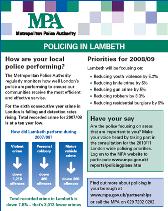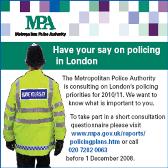Contents
This page contains issues of the MPA Direct October 2008 issue.
- MPA Direct - October 2008
- Chair of MPA, Mayor Boris Johnson sets out priorities for the Metropolitan Police in his first report to the MPA as Chairman on 6 October 2008
- Local policing summaries
- Public consultation - policing priorities 2010/11
- Mayor commissions race and faith inquiry from the MPA
- Two Ticks Good
- Race Hate Crime Forum
- And finally…..
Warning: This is archived material and may be out of date. The Metropolitan Police Authority has been replaced by the Mayor's Office for Policing and Crime (MOPC).
See the MOPC website for further information.
MPA Direct - October 2008
Issue 1
This issue of MPA Direct is available as a PDF document. Or alternatively a summary version is available below.
Chair of MPA, Mayor Boris Johnson sets out priorities for the Metropolitan Police in his first report to the MPA as Chairman on 6 October 2008
 The Mayor also paid tribute to the work of the police and outlined a new
MPA led inquiry to explore race and faith issues within the
The Mayor also paid tribute to the work of the police and outlined a new
MPA led inquiry to explore race and faith issues within the
Metropolitan Police Service.
He said:
"I was proud to chair my first meeting of the Metropolitan Police Authority. Crime and safety is the biggest issue for Londoners and my most immediate priority as Mayor of London. It is vital that the Mayor takes responsibility for making our capital a safer place.
“The amazing commitment and dedication that the police display everyday is something I am immensely proud of. We have huge challenges ahead, and the police are going to need our steadfast help and support.
“Knife crime is the most immediate policing priority and we need to build on the successes of Operation Blunt 2, we need to do more to make public transport safer, we must protect the capital from the threat of terrorism and we must ensure the Olympic Games are secure.
“It is also vital that we develop a comprehensive youth strategy that addresses the causes of youth crime and I can confirm we will make a detailed announcement in November.
“The issues of race and discrimination in the Metropolitan police must be examined. I have asked Cindy Butts to look at some key questions, such as the progression of BME candidates through the ranks of the service, the relation between staff associations and management, and the extent to which there is effective leadership around race and faith.”
Local policing summaries

achieving this.
The MPA welcomed the opportunity that the summaries have provided to raise awareness of policing issues across the Capital. The Authority believes that if local communities are to have an informed view and actively engage in policing, they need to be better informed about how policing is being delivered and understand the priority issues, as well as having a better idea of how to access, engage and influence local policing. Providing better information on local policing is also important as it supports the need to make policing truly accountable and transparent to the public.
The MPA Local Policing Summary information has been produced in partnership with central MPS units and Borough Command Units. This year we have published the summaries more widely than ever before. Space has been secured in each local authority residents’ magazine to publicise top line information and signpost where more detailed data can be found on the MPA website – the examples below are for Southwark and Havering. Thirty London boroughs have local publications, so in the two boroughs that don’t we’ve taken space in a local free paper.
The project was progressed by a working group from three units in the MPA. There was a lot of work involved, with tight deadlines and a few headaches along the way, but each person brought their own skills and together achieved the goal. Well done.
The more detailed summaries, including local information, will be added to the website as they become available.
Public consultation - policing priorities 2010/11
The Authority is asking the people of London to ‘Have your say on the policing of London.’

Basically, we’re asking:
- What are your top three priorities for policing in London?
- Why do you choose these priorities?
- What should the MPS be doing to tackle these priorities?
The advert will appear in the free London Lite newspaper on 1 October and the Evening Standard on 6 October.
Naturally we are aware that not everyone will be able to access or complete the questionnaire online, so we have published our telephone and minicom
numbers to enable people to leave a message for a paper copy or to request a call back to help complete a telephone questionnaire.
Once again, as with so many of the Authority’s projects, the end result was achieved by a working group from different units.
Mayor commissions race and faith inquiry from the MPA
MPA Chairman, Mayor Boris Johnson, has announced that the Metropolitan Police Authority will be carrying out a focussed inquiry to explore race and faith issues within the Metropolitan Police Service.
Mayor Boris Johnson said:
"Policing a multi-cultural capital requires the police to have the full confidence of the communities they serve as well as its own staff. It is important that all staff are confident and open about race and faith issues, as this will impact positively on service delivery.
"Having become Chairman of the MPA I have decided the Authority needs to be assured that the changes put in place by the MPS over the past years have indeed taken hold. If not the MPA should make recommendations for positive change."
Cindy Butts, independent member of the MPA, who will lead the inquiry, said:
"There has been a lot of press coverage over the last few weeks of how the MPS deals with race issues. This is of great concern for many reasons. It impacts on current Met BME police officers and staff, as well as the potential to recruit officers and staff from diverse groups. It also has a negative effect on
community confidence in London’s police service.
"I want our inquiry to address several key issues, such as the progression of BME candidates, the relationship between staff associations and management, recruitment, communication and proportionality, and visible leadership around race issues.
"We intend that the inquiry will harness the experience and expertise of a broad range of individuals and organisations from both the public and private sectors and draw on a wide evidence base. We anticipate reporting back to the Mayor and the Police Authority in spring 2009."
Two Ticks Good
The Authority has been awarded the two tick disability accreditation, a government award administered by Jobcentre Plus. This means we are meeting the five commitments to good employment practice. These are:
- Commitment 1: To interview all disabled applicants who meet the minimum criteria for a job vacancy and consider them on their abilities
- Commitment 2: To ensure there is a mechanism in place to discuss at any time, but at least once a year, with disabled employees what can be done to make sure they can develop and use their abilities.
- Commitment 3: To make every effort when employees become disabled to make sure they stay in employment.
- Commitment 4: To take action to ensure that all employees develop the appropriate level of disability awareness needed to make the commitments work
- Commitment 5: Each year to review the five commitments and what else has been achieved, to plan ways to improve on them and to let employees and the Jobcentre Plus know about the progress and future plans.
Well done to everyone involved in helping the Authority achieve this accolade.
Race Hate Crime Forum
RHCF welcomed Justice Byron, President of the United Nations International Criminal Tribunal for Rwanda to their meeting on 8 October 2008, to speak about his role in combating issues of genocide as part of his UN responsibility.
Since its inception the RHCF has been proactive in building both national and international links to share and support the development of good practice. At the full Authority meeting in March 2008, MPA members decided to incorporate other areas of hate crime into the RHCF agenda, bringing it in line with the MPA/MPS generic equality schemes and local government Equality Standards.
This meeting formed the initial consultation process for Forum member organisations to discuss their views for the future direction of the RHCF.
In 2007 a delegate group from the RHCF were invited to Atlanta, Georgia, USA, and the success of that visit inspired interest from the Canadian Government to meet with the RHCF in November this year. Both visits were sponsored by the Foreign and Commonwealth Office.
And finally…..
We would appreciate your feedback on this EZINE / NEWSLETTER. Please contact us by email at communications@mpa.gov.uk or telephone 020 7202 0216.
Supporting material
Send an e-mail linking to this page
Feedback